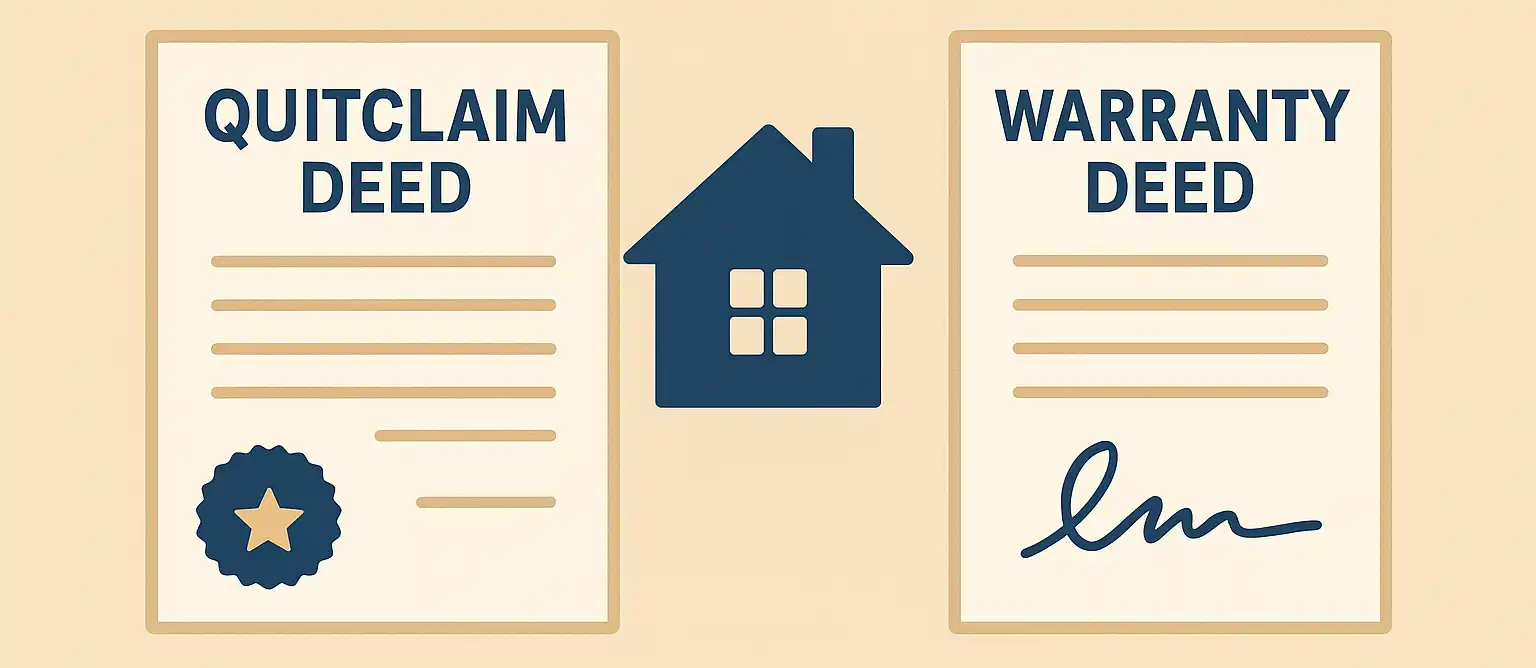
Choosing the wrong type of deed can have serious financial and legal consequences that last for years. Understanding the fundamental differences between quitclaim deeds and warranty deeds is essential for anyone involved in property transfers, whether you’re buying, selling, or transferring real estate within your family.
This comprehensive comparison explains when each type of deed is appropriate, the protections they offer, and the risks involved. By the end of this guide, you’ll know exactly which deed type fits your situation and how to proceed safely.
Quick Comparison Overview
| Feature | Quitclaim Deed | Warranty Deed |
|---|---|---|
| Warranties | None | Comprehensive |
| Title Guarantees | No guarantees | Full guarantees |
| Legal Protection | Minimal | Maximum |
| Typical Use | Family transfers | Traditional sales |
| Title Insurance | Limited coverage | Full coverage |
| Risk Level | High for grantee | Low for grantee |
| Legal Recourse | None | Full recourse |
| Cost | Lower | Higher |
Understanding Quitclaim Deeds
A quitclaim deed transfers whatever interest the grantor has in a property without making any promises about the quality of that interest. If you’re unfamiliar with quitclaim deeds, review our complete guide to understanding quitclaim deeds before proceeding.
What Quitclaim Deeds Provide
Interest Transfer Only: The grantor transfers their interest, if any, to the grantee. If the grantor owns nothing, the grantee receives nothing.
No Warranties: The grantor makes no promises about:
- Whether they actually own the property
- Whether the title is clear of liens or encumbrances
- Whether there are any title defects
- Whether they have the legal right to transfer the property
Immediate Transfer: Once signed and recorded, the transfer is complete, regardless of any title problems that may exist.
When Quitclaim Deeds Work Best
Family Transfers:
- Adding a spouse to property title after marriage
- Removing an ex-spouse during divorce proceedings
- Transferring property between parents and children
- Moving property into or out of family trusts
Title Corrections:
- Fixing name misspellings on existing deeds
- Correcting minor errors in previous transfers
- Clearing up small title issues when all parties agree
Known Parties with Trust:
- Transfers between business partners
- Situations where the grantee understands and accepts all risks
- Cases where title quality is already known and verified
Understanding Warranty Deeds
Warranty deeds provide comprehensive protections and guarantees about the property’s title. The grantor promises that they own clear title and will defend the grantee against any future claims.
Types of Warranty Deeds
General Warranty Deed (Full Warranty):
- Provides maximum protection
- Grantor warrants against all title defects, past and present
- Covers problems created by any previous owner
- Most comprehensive protection available
Special Warranty Deed (Limited Warranty):
- Provides limited protection
- Grantor warrants only against problems created during their ownership
- Does not cover problems from previous owners
- Middle-ground option between quitclaim and general warranty
Warranties Provided
Covenant of Seisin: Grantor promises they own the property and have the right to transfer it.
Covenant Against Encumbrances: Grantor promises the property is free from liens, easements, or other encumbrances except those specifically disclosed.
Covenant of Quiet Enjoyment: Grantor promises the grantee will not be disturbed in their ownership by superior title claims.
Covenant of Warranty: Grantor promises to defend the grantee’s title against any lawful claims.
Covenant of Further Assurance: Grantor promises to take any necessary actions to perfect the grantee’s title if problems arise.
When Warranty Deeds Are Essential
Traditional Real Estate Sales:
- Purchases involving strangers or arm’s-length transactions
- Any sale where the buyer is paying full market value
- Investment property purchases
- Commercial real estate transactions
High-Value Transfers:
- Properties worth substantial amounts where title problems could cause significant financial loss
- Situations where the grantee needs maximum legal protection
Unknown Title History:
- Properties with complex ownership histories
- Situations where title quality is uncertain
- Cases involving potential title defects
Risk Analysis: Who Bears the Risk?
Quitclaim Deed Risks
Grantee (Buyer) Risks:
- Hidden liens may remain attached to the property
- Ownership disputes could arise from previous transfers
- Title defects may make the property unsellable
- No legal recourse against the grantor if problems arise
- Limited title insurance coverage available
Grantor (Seller) Risks:
- Minimal risk since no warranties are provided
- Potential liability only for fraud or misrepresentation
Warranty Deed Protections
Grantee (Buyer) Benefits:
- Legal recourse if title problems arise
- Financial compensation for title defects
- Defense against title claims by the grantor
- Full title insurance coverage available
- Clear ownership with comprehensive protections
Grantor (Seller) Responsibilities:
- Financial liability for any title defects
- Legal obligation to defend the grantee’s title
- Potential costly legal expenses if problems arise
Financial Implications
Title Insurance Considerations
With Quitclaim Deeds:
- Limited coverage available
- Higher premiums due to increased risk
- Exclusions for many types of problems
- Difficult qualification process
With Warranty Deeds:
- Full coverage readily available
- Standard premiums
- Comprehensive protection against title defects
- Easier qualification and underwriting
Cost Differences
Immediate Costs:
- Quitclaim deeds: Lower preparation costs, limited title search requirements
- Warranty deeds: Higher preparation costs, comprehensive title examination required
Long-term Costs:
- Quitclaim deeds: Potential for expensive title problems later
- Warranty deeds: Protection against future title costs
Legal Recourse Comparison
After Quitclaim Deed Problems
Limited Options:
- No breach of warranty claims possible
- No recourse against grantor for title defects
- Expensive quiet title actions may be required
- Potential total loss if title problems are severe
After Warranty Deed Problems
Comprehensive Protection:
- Sue for breach of warranty if title problems arise
- Demand defense of title from grantor
- Seek compensation for financial losses
- Multiple legal remedies available
Decision Framework: Which Deed to Choose
Choose a Quitclaim Deed When:
Family Situations:
- Transferring between spouses, parents, children, or siblings
- Adding or removing family members from title
- Divorce property settlements between known parties
- Estate planning transfers to family trusts
Risk Tolerance:
- You know and trust the grantor completely
- You’ve independently verified title quality
- The property has low value relative to potential risks
- You’re willing to accept all title risks
Special Circumstances:
- Correcting minor title errors
- Clearing specific known title issues
- Business partnership property adjustments
- Gift situations between known parties
Choose a Warranty Deed When:
Traditional Purchases:
- Buying from strangers or unknown parties
- Any transaction involving substantial money
- Investment or commercial property purchases
- Situations requiring mortgage financing
Protection Needs:
- High-value property transfers
- Uncertain or complex title history
- Need for comprehensive legal protection
- Situations requiring title insurance
Professional Transactions:
- Real estate sales through professionals
- Builder or developer sales
- Auction purchases from unknown sellers
- Any arm’s-length commercial transaction
State-Specific Considerations
Legal Requirements
Deed Validity: States have different requirements for valid deeds, affecting which type is appropriate in specific situations.
Warranty Scope: Some states limit warranty deed protections or have specific statutory warranty language.
Recording Rules: State recording laws may affect the priority and effectiveness of different deed types.
Common State Variations
Community Property States: May have special requirements for spousal signatures regardless of deed type.
Homestead States: May require specific language or procedures for transfers involving homestead property.
Title Theory vs. Lien Theory: States with different mortgage theories may have varying deed requirements.
Professional Guidance Recommendations
When to Consult Professionals
Real Estate Attorney Consultation:
- High-value or complex property transfers
- Uncertain title situations
- Legal questions about deed choice
- Commercial or investment transactions
Title Company Services:
- Professional title examination
- Title insurance recommendations
- Deed preparation and recording
- Escrow and closing services
Tax Professional Advice:
- Gift tax implications of family transfers
- Capital gains considerations
- Estate planning implications
- Transfer tax requirements
According to real estate professionals, consulting with qualified experts before major property transfers can prevent costly mistakes and ensure appropriate protection for your specific situation.
Common Mistakes to Avoid
Choosing the Wrong Deed Type
Using Quitclaim When Warranty Is Needed:
- Accepting quitclaim deeds in traditional sales
- Not considering title insurance implications
- Underestimating financial risks
Using Warranty When Inappropriate:
- Creating unnecessary liability for family transfers
- Over-complicating simple corrections
- Increasing costs for low-risk situations
Ignoring State Requirements
Legal Compliance Issues:
- Not meeting state-specific deed requirements
- Ignoring local recording rules
- Missing required disclosure forms
Inadequate Due Diligence
Title Problems:
- Not researching title history before choosing deed type
- Assuming title quality without verification
- Ignoring existing liens or encumbrances
Alternatives to Consider
Other Deed Types
Grant Deeds: Used in some western states, providing middle-ground protection between quitclaim and warranty deeds.
Bargain and Sale Deeds: Common in some eastern states, offering limited warranties about the grantor’s actions.
Executor’s/Administrator’s Deeds: Special deeds for estate property transfers with specific warranty limitations.
Non-Deed Alternatives
Life Estate Deeds: For estate planning purposes, allowing lifetime use while transferring future ownership.
Trust Transfers: Moving property into trusts for estate planning and asset protection.
Contract for Deed: Alternative financing arrangements that may be appropriate in some situations.
Making Your Decision
Assessment Questions
Ask yourself these key questions before choosing:
- What is my relationship to the other party? (Family vs. stranger)
- How much money is involved in this transfer?
- What do I know about the property’s title history?
- How much risk am I willing to accept?
- Do I need comprehensive legal protection?
- Will I need title insurance for this transfer?
- What are the long-term implications of this choice?
Risk vs. Protection Balance
Lower Risk, Lower Protection: Quitclaim deeds work when risks are manageable and parties trust each other.
Higher Risk, Higher Protection: Warranty deeds provide comprehensive protection when risks are significant or unknown.
Conclusion
The choice between quitclaim and warranty deeds depends on your specific situation, risk tolerance, and protection needs. Quitclaim deeds work well for family transfers and situations involving known, trusted parties, while warranty deeds provide essential protection for traditional sales and high-value transactions.
Before making your decision, consider the financial implications, legal protections, and long-term consequences of each option. When in doubt, professional consultation can help ensure you choose the appropriate deed type and complete your transfer safely and legally.
Remember that property transfers are permanent legal actions with lasting consequences. Taking time to understand your options and choose the right deed type protects your interests and helps ensure a successful transfer.
For complex situations or when comprehensive protection is needed, consider working with qualified real estate professionals who can guide you through the process and ensure your transfer is completed correctly according to your state’s requirements.
Sources:
- American Bar Association. “Residential Real Estate FAQs.” ABA.org
- National Association of Realtors. “Real Estate Transfer Guidelines.” NAR.org
This guide provides general information about deed types and should not be considered legal advice. Property laws vary by state, and specific situations may require consultation with qualified legal or real estate professionals.


Leave a Reply